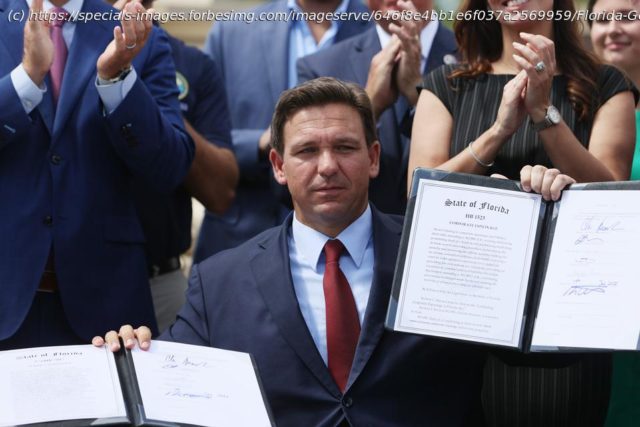Florida’s law targeting Chinese homebuyers may be unconstitutional and more restrictive than thought due to immigration law.
Two H-1B visa holders and an international student are plaintiffs in a lawsuit alleging Florida’s new law preventing many Chinese citizens from purchasing real estate in the state is unconstitutional. The state will also require U.S. citizens in Florida to attest that the law doesn’t apply to them when buying real estate. Florida Gov. Ron DeSantis has highlighted the new law while pursuing the Republican nomination for president. Analysis shows the law is likely more restrictive than the plaintiffs in the lawsuit argue due to the use of the term “visa” in the bill rather than “status.”The Florida Law’s Main Provisions
Starting July 1, 2023, Florida law S.B. 264 prohibits a citizen of China from buying real estate in the state unless certain exceptions apply. The exceptions include that it is only “one residential real property that is up to 2 acres” and the “parcel is not on or within 5 miles of any military installation in the state.” The person must have a “current verified United States Visa that is not limited to authorizing tourist-based travel” or have been granted asylum.
The measure applies to “Any person who is domiciled in the People’s Republic of China and who is not a citizen or lawful permanent resident of the United States.” A person who is a citizen of China (and not a U.S. citizen or lawful permanent resident) who meets one of the exceptions and already owns property in Florida “may not purchase . . . any additional real property” in the state.
Other provisions apply to citizens of China, Russia, Iran, North Korea, Cuba, Venezuela and Syria unless they qualify for an exception. These include prohibitions on purchasing agricultural land or real estate near a military installation or critical infrastructure.
The law also places new requirements on American citizens in Florida. “At the time of purchase, a buyer of real property in this state must provide an affidavit signed under penalty of perjury attesting that the buyer is” not prevented from buying the real estate due to the new law. This illustrates how immigration-related restrictions often also affect U.S.-born citizens.The Lawsuit
A lawsuit filed on May 22, 2023, challenges the Florida law, arguing it “imposes discriminatory prohibitions on the ownership and purchase of real property based on race, ethnicity, alienage, and national origin—and imposes especially draconian restrictions on people from China.”
The complaint discusses the impact of the law on the plaintiffs—four Chinese citizens who live in Florida and a real estate brokerage firm that serves Chinese and Chinese American clients.
“They will be forced to cancel purchases of new homes, register their existing properties with the State under threat of severe penalties, and face the loss of significant business,” according to the complaint. “The law stigmatizes them and their communities, and casts a cloud of suspicion over anyone of Chinese descent who seeks to buy property in Florida. Under this discriminatory new law, people who are not U.S. citizens or permanent residents, and whose ‘domicile’ is in China, will be prohibited from purchasing property in Florida.
“A similar but less restrictive rule will apply to people whose permanent home is in Cuba, Venezuela, or other ‘countries of concern.’ The sole exception to these prohibitions is incredibly narrow: people with non-tourist visas or who have been granted asylum may purchase one residential property under two acres that is not within five miles of any military installation in the state. Notably, there are more than a dozen military installations in Florida, many of them within five miles of city centers like Orlando, Tampa, Jacksonville, Pensacola, Panama City, and Key West. Florida’s new law will also impose requirements on people from China and other ‘foreign countries of concern’ to register properties they currently own, at the risk of civil penalties and civil forfeiture. People who own or acquire property in violation of the law are subject to criminal charges, imprisonment, and fines.”
The attorneys for the plaintiffs are the ACLU Foundation of Florida, the American Civil Liberties Union Foundation, the DeHeng Law Offices and the Asian American Legal Defense and Education Fund. The attorneys filed the complaint in the U.S. District Court for The Northern District of Florida Tallahassee Division.
“The law may be even more restrictive than the lawsuit indicates,” according to Kevin Miner, a partner at Fragomen. “This is because the statute uses incorrect immigration terminology to describe the exception. The statute appears to try to create an exception for individuals who are in the U.S. on a longer-term nonimmigrant status but does so by referencing a ‘visa’ rather than nonimmigrant status.






